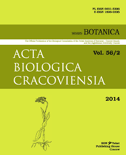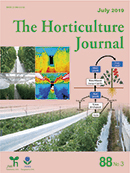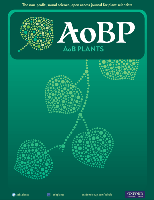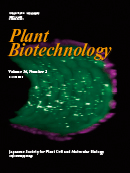
JOURNAL OF PLANT GROWTH REGULATION
Scope & Guideline
Advancing the Science of Plant Growth
Introduction
Aims and Scopes
- Plant Growth Regulators and Their Applications:
Research on various plant growth regulators (PGRs) such as jasmonic acid, gibberellins, and abscisic acid, exploring their roles in promoting growth, enhancing stress tolerance, and improving yield in various crops. - Abiotic Stress Responses:
Studies investigating how plants respond to abiotic stresses such as drought, salinity, heat, and heavy metal toxicity, focusing on physiological, molecular, and biochemical mechanisms. - Microbial Interactions and Plant Growth Promotion:
Research exploring the role of beneficial microbes, including plant growth-promoting rhizobacteria (PGPR) and arbuscular mycorrhizal fungi, in enhancing plant growth and stress tolerance. - Genetic and Epigenetic Regulation:
Investigations into the genetic and epigenetic factors that regulate plant responses to stress, including transcriptomic and proteomic analyses to identify key regulatory pathways. - Biostimulants and Sustainable Agriculture:
Studies on the use of biostimulants, including natural extracts and nanoparticles, to enhance plant growth, nutrient uptake, and resilience against environmental stresses. - Physiological and Morphological Adaptations:
Research examining the physiological and morphological changes in plants under various environmental conditions, including the role of phytohormones in mediating these adaptations.
Trending and Emerging
- Integrative Approaches to Stress Management:
There is a growing trend towards integrative strategies that combine various methods, such as the use of biostimulants, microbial inoculants, and environmentally friendly practices to enhance plant resilience against abiotic stresses. - Gene Editing and Biotechnology:
Research focusing on gene editing techniques, particularly CRISPR technology, is on the rise, as scientists explore ways to enhance stress tolerance and improve crop traits at the genomic level. - Nanotechnology in Agriculture:
The application of nanotechnology, particularly in the form of nanoparticles as fertilizers or biostimulants, is gaining traction, reflecting a trend towards innovative and efficient agricultural practices. - Secondary Metabolite Production:
There is an increasing focus on the role of secondary metabolites in plant defense mechanisms and their potential applications in improving crop resilience and quality. - Climate Change Adaptation Strategies:
Research addressing the impacts of climate change on plant growth and development, and strategies for adaptation, is becoming increasingly prominent, highlighting the need for sustainable agricultural practices.
Declining or Waning
- Traditional Breeding Techniques:
There has been a noticeable decline in publications focusing solely on traditional breeding methods, as genomic and biotechnological approaches gain more attention for crop improvement. - Single-Factor Studies:
Research that examines the effects of single environmental factors (e.g., only drought or only salinity) is becoming less common, with a trend towards studying multifactorial interactions that better reflect real-world conditions. - Basic Physiological Studies:
There is a decreasing focus on fundamental physiological studies without direct applications or implications for crop improvement or stress management, as applied research takes precedence. - Chemical Fertilizer Studies:
Research centered around the effects of chemical fertilizers alone is declining, with a shift towards integrated approaches that combine organic amendments, biostimulants, and sustainable practices.
Similar Journals

ACTA BIOLOGICA CRACOVIENSIA SERIES BOTANICA
Fostering a deeper understanding of our botanical heritage.ACTA BIOLOGICA CRACOVIENSIA SERIES BOTANICA is a distinguished journal published by the Polska Akademia Nauk (Polish Academy of Sciences), with its roots tracing back to 1996. As a pivotal publication in the field of Plant Science, it serves to disseminate high-quality research and findings, contributing to the ongoing development and understanding of biodiversity, plant ecology, and conservation. The journal is indexed under Scopus, ranked #203 out of 516 in its category, placing it in the 60th percentile and firmly within Q3 quartile for Plant Science in 2023. Researchers, professionals, and students will find invaluable content within its pages, enhancing their knowledge and supporting academic exploration. Although it currently does not offer open access options, the journal remains a crucial resource for those engaged in botanical sciences, with a commitment to advancing scholarship in Poland and beyond.

Horticulture Journal
Cultivating Knowledge, Growing FuturesThe Horticulture Journal, published by the Japan Society for Horticultural Science, is a leading academic platform dedicated to the advancement of horticultural research and practices. With an ISSN of 2189-0102 and an E-ISSN of 2189-0110, this journal endeavors to publish high-quality research that emphasizes innovative techniques, sustainable practices, and the science of plant cultivation. The journal has been recognized for its impact within the field, currently holding a Q2 ranking in Horticulture and a Q3 ranking in Plant Science as of 2023, indicating its significant contribution to advancing knowledge. With its open-access model, researchers, professionals, and students have the opportunity to engage with the latest findings, thanks to the journal's commitment to widespread dissemination of information. Since its convergence period began in 2015 and continuing through to 2024, the Horticulture Journal remains instrumental in promoting sustainable and beneficial practices in horticulture science globally.

Tropical Plant Biology
Cultivating Insights into Tropical EcosystemsTropical Plant Biology is a premier academic journal published by Springer, dedicated to advancing the understanding of tropical plants and their ecological significance. With an ISSN of 1935-9756 and an E-ISSN of 1935-9764, this journal serves as a vital platform for researchers, professionals, and students focused on the fields of Genetics and Plant Science. Notably recognized in 2023 as a Q2 journal in Plant Science and Q3 in Genetics, it ranks 171st out of 516 in Agricultural and Biological Sciences and 227th out of 347 in Genetics according to Scopus. The journal encompasses a diverse range of topics, offering insights into tropical plant biology, ecology, conservation, and biodiversity. Although it does not currently operate under an open-access model, it remains an essential resource for anyone passionate about tropical ecosystems and their intricate relationships. With contributions spanning from 2009 to 2024, Tropical Plant Biology continues to foster scholarly discourse and innovation in the field.

AoB Plants
Connecting researchers to cultivate knowledge.AoB Plants is a distinguished open-access journal published by Oxford University Press, dedicated to advancing the field of plant science. Since its inception in 2009, this journal has played a pivotal role in disseminating high-quality research that encompasses a wide range of topics including plant biology, ecology, and biotechnology. With an impressive impact factor and a ranking in the Q1 quartile for Plant Science, AoB Plants is recognized for its innovative contributions and scholarly rigor, ranking #129 out of 516 in the Scopus Agricultural and Biological Sciences category, placing it in the 75th percentile among its peers. By promoting open-access availability of research findings, the journal empowers researchers and practitioners alike, facilitating greater collaboration and knowledge sharing in the global scientific community. Situated in the heart of the United Kingdom, AoB Plants continues its commitment to providing a platform for pioneering research and developments in plant science, thus fostering a deeper understanding of the crucial roles that plants play in our ecosystems and economies.

ACTA PHYSIOLOGIAE PLANTARUM
Cultivating knowledge in agronomy and crop science.ACTA PHYSIOLOGIAE PLANTARUM, published by Springer Heidelberg, is a leading journal dedicated to advancing the fields of Agronomy, Plant Science, and Physiology. With an ISSN of 0137-5881 and an E-ISSN of 1861-1664, this esteemed publication has a significant global outreach, being based in Germany. The journal is recognized for its impactful contributions, currently holding a Q2 ranking in both Agronomy and Crop Science, as well as Plant Science, and a Q3 ranking in Physiology according to 2023 category quartiles. Its Scopus rankings reflect its reputable standing within the academic community, with notable placements in Agricultural and Biological Sciences, further highlighting its importance for researchers and professionals in the field. The objective of ACTA PHYSIOLOGIAE PLANTARUM is to foster robust discussions and disseminate innovative studies that enhance our understanding of plant physiology and its applications. Though not an open-access journal, it provides comprehensive access options for readers keen on exploring cutting-edge research that drives advancements in agricultural productivity and sustainability. Through its dedication to excellence, this journal continues to be a vital resource for advancing knowledge and practices in plant sciences.

JOURNAL OF PLANT BIOCHEMISTRY AND BIOTECHNOLOGY
Leading the Charge in Plant Biotechnology AdvancementsJOURNAL OF PLANT BIOCHEMISTRY AND BIOTECHNOLOGY, published by SPRINGER INDIA, is a leading publication dedicated to advancing research in the fields of plant biochemistry, biotechnology, agronomy, and crop science. With an ISSN of 0971-7811 and E-ISSN 0974-1275, the journal encompasses a wide range of studies aimed at enhancing our understanding of plant biological processes and their applications in agriculture and biotechnology. It has achieved a noteworthy Q2 ranking in Agronomy and Crop Science and Plant Science, as well as a Q3 ranking in Biotechnology, reflecting its quality and relevance in contemporary research. Notably, the journal ranks #166 in Plant Science and #133 in Agronomy, both falling in the top 67th percentile. With a rich history spanning from 1992 to 2024, the journal is committed to providing open access to innovative research findings that bridge the gap between laboratory discoveries and their practical applications in sustainable agriculture. Researchers, professionals, and students will find a wealth of knowledge and inspiration to advance their work in the dynamic field of plant sciences at this esteemed journal.

PLANTA
Unveiling the secrets of plant evolution and biochemistry.PLANTA, published by SPRINGER, stands as a pivotal journal in the field of plant sciences and genetics, known for its rigorous peer-reviewed research that has influenced the advancement of botanical science since its inception in 1925. With an impressive trajectory of convergence from the years 1925 to 1945, and again from 1947 to 2024, this journal maintains a strong reputation, currently categorized in the prestigious Q1 tier of Plant Science and Q2 tier in Genetics as of 2023. The journal is recognized for its high impact, ranked #64 out of 516 in Plant Science by Scopus, representing the top 87th percentile within its category, while also securing a strong position in Genetics with a #92 rank. The journal serves as a critical resource for researchers, professionals, and students who are eager to explore the complex genetics, biochemistry, and evolutionary biology of plants. Though primarily subscription-based, the quality of the research published in PLANTA makes it an essential reading for anyone serious about advancing their knowledge and understanding of plant sciences.

Propagation of Ornamental Plants
Cultivating Knowledge in Ornamental HorticulturePropagation of Ornamental Plants is a distinguished journal published by SEJANI PUBL that focuses on the field of ornamental horticulture, an area critical to both commercial and aesthetic applications in the environment. With an ISSN of 1311-9109, this journal serves as a platform for scholarly articles and research spanning from 2005 to 2021, and resuming in 2023. While its current Category Quartiles place it within the Q4 rankings for Forestry and Plant Science, this journal remains committed to providing valuable insights and research findings related to plant propagation techniques, environmental sustainability, and ornamental plant breeding. Despite being an underrepresented publication within its field, its efforts contribute to the body of knowledge necessary for advancing both academic research and practical applications. For researchers, professionals, and students alike, Propagation of Ornamental Plants stands as an essential resource for advancing the field and fostering innovation in ornamental horticulture.

JOURNAL OF PLANT RESEARCH
Cultivating Knowledge, Growing Innovation.JOURNAL OF PLANT RESEARCH, published by SPRINGER JAPAN KK, is a leading academic journal that has carved a niche in the field of Plant Science. With its ISSN 0918-9440 and E-ISSN 1618-0860, this journal has been disseminating high-quality research since its inception in 1993 and continues to be essential reading for academics and practitioners alike, aiming to bridge the gap between innovative plant research and practical applications. The journal is highly regarded, holding a prestigious Q1 ranking in Plant Science for 2023, and is positioned in the top 80th percentile within the Scopus rankings for Agricultural and Biological Sciences. The journal's coverage includes a wealth of topics pertinent to advancing our understanding of plant biology, ecology, and sustainable agricultural practices. Although it operates under a subscription model, its influence in the research community remains profound, making it a vital resource for contemporary studies in plant-related disciplines.

Plant Biotechnology
Pioneering Discoveries in Plant Biotechnology.Plant Biotechnology is a distinguished journal published by the Japanese Society for Plant Cell and Molecular Biology, committed to advancing the field of plant biotechnology through the dissemination of high-quality research. With an ISSN of 1342-4580, this journal caters to a global audience interested in agronomy, crop science, and plant molecular biology. The journal has achieved notable rankings, including Q2 in Agronomy and Crop Science and Q2 in Plant Science, underscoring its relevance and impact in these fields according to the latest 2023 metrics. Furthermore, it holds a respectable position within Scopus rankings across multiple categories, indicating its contribution to the academic community. Although it is not an open-access journal, its regular publications, spanning from 1997 to 2024, feature cutting-edge studies that explore innovative approaches and technologies in plant science. Researchers, professionals, and students will find Plant Biotechnology an essential resource for staying informed on significant advancements and trends in plant research.